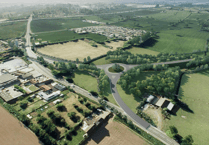Bath & North East Somerset Council is boosting its investment in tackling the climate and nature emergency, including improving access to local nature and more sustainable travel schemes.
A report agreed by full council in February, as part of the council’s budget, saw £2.235m of investment approved over the next five years in capital schemes under the Climate Emergency and Sustainable Transport portfolio.
It will support renewable energy schemes, active travel, and nature recovery projects – including Bathscape, Waterspace Connected and Somer Valley Rediscovered - to secure better access for people to local nature in line with the Ecological Emergency Action Plan. In addition, a further £18.953m of schemes are in the pipeline, including further renewable energy projects, more tree planting and an ecology centre.
Capital schemes across the council are set to tackle the climate and ecological emergency, including investment in parks, sustainable transport initiatives and our Liveable Neighbourhoods programme. Projects in the pipeline also include the Scholars’ Way link in Bath and greening the council’s Neighbourhood Services fleet, as well as Midsomer Norton and Westfield, Walking, Wheeling and Cycling Links.
In addition to this long-term capital investment, the council’s day-to-day revenue budget, which was also agreed at council in February, supports the council’s continued implementation of its Climate Emergency Action Plan, working with partners to develop new renewable energy, contributing to our district-level targets of an additional 300MW generating capacity by 2030. The council has an existing multi-year capital budget for investment in renewables in its own buildings and land.
In his column for The Journal this month, Lib Dem Leader of B&NES Council, Kevin Guy, revealed that nine parish and town councils in Bath and North East Somerset are set to benefit from £260,000 to help install energy-saving measures like solar panels and air-to-air source heat pumps. Funding comes from the West of England Rural Fund, which is funded by the UK government through the Rural England Prosperity Fund, part of the UK Shared Prosperity Fund.
Cabinet member for Climate and Sustainable Travel Councillor, Sarah Warren, said: “Despite the many challenges facing the council’s budget I am proud that we have boosted investment in our key priority of tackling the climate and ecological emergency, as can be seen by the projects in train and in our pipeline. However, tackling these emergencies across our district needs more than just council investment.
“So we are working in partnership to secure more investment from external sources and I am delighted to see the progress we have made, particularly on renewables and retrofitting, working with the West of England Combined Authority and others. As well as helping make homes more energy efficient, the programme will also help relieve some of the current cost-of-living pressures.”
More than £6m is allocated across the region for the retrofit project, with Phase 1 support for homeowners already live.
More information on how the council is tackling the climate emergency and what residents can do to contribute can be found at https://beta.bathnes.gov.uk/climate-emergency.



